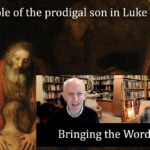The Sunday lectionary gospel for Trinity 13 in Year C is the first two of the three ‘parables of the lost’ in Luke 15, the parable of the lost sheep and the parable of the lost coin. We don’t go on to read the third, the parable of the prodigal son, since we read that earlier in the year on the fourth Sunday of Lent.
In contrast to some of the surrounding chapters, this looks like a clearly linked block of teaching filling the whole of chapter 15. There is no specific location or timing given, but a general introduction about Jesus’ practice, though there are some links with the material either side, not least in the mention of the theme of table fellowship.
I had an interesting discussion with a friend online earlier in the week, where he suggested that these parables should be understood the opposite way around from the traditional reading, with the thing that was lost and found being Jesus and the kingdom, and the one searching being the person who discovers faith. (You might pause for a moment, and consider the merits of this reading, and why it might or might not be persuasive, before reading on…) I don’t think this is a persuasive interpretation, but it highlights two things: first, as I have mentioned before, that Jesus’ teaching in parables is not always immediately clear to us, because of the implicit cultural assumptions that are often built in; and, second, that we need to check ‘traditional’ uses of these parables against what the text actually says.
‘Tax collectors’ would generally have been seen as the notorious element of Luke’s world, despised and dishonest people who collaborated with the occupying Roman power and exploited others for their own gain. But throughout Luke they are depicted as those who (surprisingly) respond to this spiritual renewal movement, both in John’s ministry (Luke 3.12) and Jesus’ (Luke 5.27). ‘Sinners’ refers to those who do not meet the demands of being ‘righteous’, and so are at the margins of religious society, and are probably ready to respond in repentance—but the term is use by Luke in quite general ways. Although it might on occasion have overtones of sexual sin (e.g. in Luke 7.37), that is not a necessary implication. It is striking that, just as Jesus has consistently drawn a crowd ‘along the way’, these kinds of people are ‘gathering to him’. They are instinctively drawn to his teaching and his presence.
The complaint of the ‘Pharisees and teachers of the law’ about the company Jesus keeps closely echoes their complaint against him in Luke 5.30. There is a hint in their accusation that Jesus does not merely accept invitations, but acts as host himself, in the language of ‘receives’ or ‘welcomes’ (προσδέχεται), but in fact the only meal at which Jesus is depicted explicitly as host is the last supper. In contrast to Luke 5.31–32, Jesus does not offer a direct answer, but instead tells the three parables.
All three have a similar structure, in which something is identified as ‘lost’, there is a searching, that which was lost is found, and the end result is rejoicing. The first two are tightly parallel, whilst the third is much more developed, and the question of ‘searching’ by the father is handled in a different way. But there is also a notable increase in the importance of the lost, from being 1 in a 100, to one in ten, to being one of two sons.
The term ‘shepherd’ is not mentioned in the first parable, but is implied by the presence of sheep. Although there is a popular reading of this story in which the despised and marginal shepherd is foolish enough to leave the 99 unprotected in order to find the one that is lost, none of this has foundation either in the text or in cultural reality. David Croteau explores the status of shepherds in relation to the Christmas story in Luke 2, and comments:
Besides Aristotle, a comment by Philo, and one statement in the Mishnah, the bulk of the quotes used to demonstrate that shepherds were despised were taken from the Babylonian Talmud. I was unable to find even one source from first-century Israel used to support the view that shepherds were societal outcasts. Therefore, this viewpoint is dated after the events being studied in Luke 2. It is unreliable information and should be discarded when interpreting the Gospels.
Given that the normal flock for an average family would be 10 to 15 sheep, this person is represented as extremely wealthy. I am writing this sitting in the desert in Jordan (as it happens), and even today it is not uncommon to see flocks of sheep and goats wandering apparently without a herdsman; the primary focus here is that the one has become separated off from the rest of the herd, and so would be distressed and in need of gathering back. And those whom Jesus is addressing, who see themselves as leaders of Israel, could hardly fail to see the connections with God’s rebuke to the failed ‘shepherds’ of Israel in Ezek 34.7–11. This, then, also gives Jesus’ teaching a Christological significance; in Ezek 34.11, where Israel’s leaders have failed, God himself shepherds his people. Where the Pharisees and teachers of the law have failed to seek the lost, Jesus himself become the Shepherd of Israel.
A possible inference from the parable is that the ‘one’ is more important than the 99 who have been left, and in fact the apocryphal Gospel of Thomas makes this explicit by straightening out the story’s logic; the lost sheep is the largest, and the shepherd tells it ‘I love you more than the ninety-nine’ (G Thom 107). But Mikeal Parsons (Paideia p 236) highlights the numerological significance of the 99 and 100. Counting on one’s fingers (flexio digitorum) was very commonplace in the Roman world, and was in fact seen as an indispensable skill for the educated (See Quintilian Inst 1.10.35). Up to 99, you would count on the left hand, but for three-digit numbers from 100, you would count on the right hand. In an age that preferred the right to the left, Luke’s Jesus is telling us that the whole flock is out of kilter as long as the one is missing—and the whole flock is ‘put right’ when the one returns. No wonder there is so much rejoicing!
The parallel parable of the woman searching for the coin forms one of the many male-female pairs in Luke’s gospel, and offers a surprising image of the searching of God for the lost in contrast to the more conventional images of the shepherd and the father.
Kenneth Bailey reminds us how unusual it would be to have coins in a peasant home:
The peasant village is, to a large extent, self-supporting, making its own cloth and growing its own food. Cash is a rare commodity. Hence the lost coin is of far greater value in a peasant home than the day’s labor it represents monetarily (Kenneth Bailey, Poet & Peasant and Through Peasant Eyes: A Literary Cultural Approach to the Parables in Luke, 1983, p 157).
 The set of ten coins was most likely either some family savings, or possibly the dowry given to the woman by her husband on her marriage. I took this picture on a recent trip to the museum of Jordanian culture in Amman; you can see the dowry coins worn around the neck, though they might have also been worn on the forehead for more prominent display.
The set of ten coins was most likely either some family savings, or possibly the dowry given to the woman by her husband on her marriage. I took this picture on a recent trip to the museum of Jordanian culture in Amman; you can see the dowry coins worn around the neck, though they might have also been worn on the forehead for more prominent display.
There is a lovely modern depiction of the anxiety of losing something valuable in the opening scene of Lord of the Rings: the Fellowship of the Ring, when the old Bilbo temporarily forgets where the Ring is, only to find it in his waistcoat pocket.
Two keys things are worth noting in reading these parables. The first is the jarring discontinuity between the content of the stories and Jesus’ exposition of their meaning. In neither case does the thing that is lost show awareness of its lostness or play any role in its own recovery. And yet in both explanations, Jesus explicitly emphasises that rejoicing comes when ‘sinners repent’. And earlier, Luke has made explicit what is only implicit in Matthew and Luke, that Jesus has come to those sick in sinfulness to bring the medicine of forgiveness: ‘I have not come to call the righteous, but sinners to repentance‘ (Luke 5.32). Bruce Chilton comments:
Repentance, a turning back to what alone has value, is a necessary and inescapable aspect of entering the kingdom; it is implicit in much of Jesus’ discourse, and need not be named to be operative. (cited in Joel Green NICNT p 575)
This means that the reversal of the kingdom is not so much from exclusive to inclusive, but from established norms to the criterion of repentance and faith.
Secondly, we need not worry about this mismatch, since the focus is consistently theocentric. The concern here is less on what is needed from the individuals, but the priority and concerns of God. The opening question focusses primarily on Jesus; the focus in the parables is the joy of the one searching and finding that which was lost; and the rejoicing is ‘in heaven’ and ‘amongst the angels’. That is why the non-conventional reading I mentioned at the beginning is unconvincing.
There are implications for our own priorities and practice. Andrew Wilson offers fascinating reading of the parallel account in Matthew 18, where the searching of the shepherd appears to be an explicit lesson for the fellowship of believers. But here in Luke, the focus is on God himself; he is the pursing shepherd and the anxiously searching woman who longs for us to be found again.
Although Jesus’ final remarks do not develop it, the enhanced portrayal of the woman’s efforts as she attempts to locate what has been lost might also provoke reflection on the initiative taken by God in human recovery. (Joel Green, p 576)
Video discussion of these issues, and how they shape our ministry and preaching, will follow in the next post.






























Thanks Ian. Interested in David Croteau’s comments about shepherds. I’ve been trying to track this down for about a year. Shepherd is a highly esteemed leadership figure in both OT and NT and yet (it seems, under the influence of Jeremias) the church has read the Talmud back into the gospels and pictured shepherds as social outcasts. I agree with David but am not up on current scholarship in this area – would his view be taken as ‘gospel’ now 🙂 ?
I am not sure whether there has been much engagement with his view, but I hope my comments on any passage that mentions shepherds points people to it.
What is interesting is that in this passage, people commonly say ‘Ah, silly old shepherd’ but they generally don’t do that in relation to John 10! Which rather confirms his point.
Thanks. I’ll look out for any others.
I’m fairly confident that the Mishnah and Talmud point to a divergence between the Jewish and Christian community. Actually, I am assuming, the Talmud gives evidence of how much the early church thought of Jesus as the good shepherd and church leaders as ‘under-shepherds’. As Jews wanted to distance themselves from the Nazarenes so they wanted to disparage the role of shepherd.
Great. Do you know of any further literature on this question?
To a naive non-scholar outsider, I’d say that it looks very unlikely that the Jews would want to disparage the role of shepherd. Wouldn’t that mean disparaging Abraham, Isaac, Jacob, David – and large numbers of the people of God from the Old Testament?
Well, of course it is entirely possible that they despised their own roots.
That’s why I asked my first question Ian – I haven’t come across much literature on this. Timothy Laniak in the NSBT series briefly mentions it. As far as I can tell people have just followed the Talmud ever since Jeremias but I’ve never been convinced and I’m pleased to hear that it is now being challenged. I imagine that you are more likely to come across someone writing on this area than me … since I’m not a professional academic.
That’s why I asked my first question Ian – I haven’t come across much literature on this. Timothy Laniak in the NSBT series briefly mentions it. As far as I can tell people have just followed the Talmud ever since Jeremias but I’ve never been convinced and I’m pleased to hear that it is now being challenged. I imagine that you are more likely to come across someone writing on this area than me … since I’m not a professional academic.
You give the translation of v10 as joy “among the angels”. However, most translatations have either “before the angels” or “in the presence of the angels.” I think this is significant. There is a development from the “joy in heaven” of v7, to joy before the angels in v10. Who is ‘before’ the angels but God himself? Then in the next parable this is developed more in the figure of the father who so longs for his son’s return/repentance that he sees him a long way off, and casts aside decorum to run out to him.
Even in these two parables we capture something of the heart of God longing for the return/repentance of the sinner.
I remember my NT Professor, Edward Donnelly, making the point too… that it is rejoicing in the presence of the angels, and who is it that is in the presence of the angels…?
Jock – handling the Talmud is complicated. It writes down oral tradition that, allegedly, goes all the way back to the Babylonian exile. However, it was actually written down after Jesus – even the Mishnah was. Therefore, it is my hypothesis, that Jews who (as you point out) were used to regarding shepherds highly were getting fed up with these Nazarenes who get banging on about Jesus – the good shepherd – so they might have been tempted to take down the status of shepherd a peg or two so that worshipping a shepherd would not sound so great. Also it is possible that increased urbanisation led to trades like shepherding increasingly being looked down upon by urban elites.
John – yes – what you say about urbanisation and – frankly – snobbery – rings a bell.
We’re talking about shepherds here, but another profession that we see prominently in the New Testament is the fishing – and I get the impression that this is equally disparaged.
Both my grandfathers were fishermen – and therefore I’ve always found myself getting highly irritated when biblical commentators (or people giving sermons) talk about `poor fishermen’ in a condescending manner.
In fact, I see the fishing community from the time of my grandparents as a pinnacle of Christian virtue. If I could find a fellowship that is anything like what these fishermen’s meeting halls were like, I’d join it instantaneously.
Nevertheless, there might be something in this negative take on the fishing. My grandmother (father’s side) considered that her life had been a success because none of her sons went to sea. Only one of my cousins went to sea, but he suffered from asthma – and rapidly had to stop the fishing when he had an asthma attack out at sea – and had to be taken ashore to hospital as an emergency by helicopter.
But the people you are describing, who looked down on trades like shepherding also looked down on the fishing in the same way.
Hello David,
That is indeed something I have heard/ read by some well known evangelical, pastor/preacher/teacher/ theologian, but I can not recall who it was. It may have been Mike Reeves, but I could be wrong. That it is God rejoicing was the cause to recall it as up ’till then all I’d come across was that it was the Angels rejoicing in heaven, heaven rejoicing, but somehow God wasn’t part of it, impliedly at arm’s length as perhaps an on-looker, but not central to the joy.
Thanks Ian.
I have assumed that there are those shepherds who are sheep-owners, where it is a family thing and there may have been those who were hired to help, not least at night – “hireling” in John 10. The “sinners” are those who cannot attain clean-ness before God, often because their job makes them unclean, or they lack the time or money to fulfil the laws. The Hebrew is I think am-haaretz, people of the earth, and I think the hireling shepherd would fit within this group.
The parables themselves – as you say – are of objects that are rescued, which do not repent, yet there is joy from the owner at their being found. The theological application does talk about repentance, and the third parable does so in greater detail in the narrative, but the import of the first two parables would seem to be that God is concerned for what is lost, and rejoices to find it and restore it to its company.
I suggest that these parables may challenge too narrow a view of repentance rather than that they should be read through the lens of that view.
While the gospel writers say the message is one of repentance, of turning to God, etc, I don’ think there is a single occasion when Jesus tells an individual who is with him, certainly not a needy one, to repent. Prevenient grace is joyful and risky.
There is delight in these two short stories, in the man and in the woman because they have found what was lost. The older brother could not delight in his brother’s return and we don’t know if he ever entered the house.
O Dear Peter,
Not another divergence into the topic of * previent grace* it is hoped.
Jesus came to save that which was lost including the two lost sons, including the elder son ( a metaphor for Israel outwardly obedient, yet estranged in hard hearted disaffection?). Jesus is the true Elder Son – always (at home, at one) with the Father- all his- obedient, prodigiously sharing his inheritance with the lost seeking them out- all that the Father has given him.
Does Jesus not act as host at the feeding of the five and four thousand?
At one level, yes. But this is not happening at his home, and people have come to hear his teaching, rather than by invitation. And of course these point to the Last Supper and Jesus offering us the bread of life.
Just listened to video chat and read your blog on Luke 25:1-10.
I’m no theologian, I blog to share my life experiences which have developed a great deal in recent years. Retirement has enabled me to allow more time for pilgrimage. Time to read, write, listen regularly. I emailed myself the link to this a few weeks ago as it spoke to me and I wanted time to absorb in detail.
I am sitting in my motorhome overlooking the sea in heavy showers and bright sunny periods reflecting on the sea.
Over the past few years I have spent some time reflecting on passages in the Bible regarding sheep and shepherding. This particular passage together with the following verses regarding the prodigal son have spoken to me in a major way due to listening to others views.
For example, a member of clergy ( his name I won’t mention without his permission) talked of these three linked parables as you do with regard to the importance of one in 100 versus one in 10 versus one in two. he spoke of when he was a young curate in Wales and had referred to the one in 100 sheep being of perhaps less importance than the one in 10 denarii. he spoke of the value of denarii in the time of Luke. He then said that he was somewhat surprised that a very broad Welsh accent responded to him from the congregation saying ‘I would have to disagree with you there vicar’. There followed an interaction right in the middle of the sermon around the importance of 1 sheep to this farmer as a shepherd. He said what a difference it had made to him around the importance of 1 in however many. He finished his sermon to us that day by assuring us that we were all that one in Christ’s eyes.
I continue to read, to write and to listen And hope to collate my own thoughts and feelings around Jesus as the shepherd, the gate and the way in a future blog.
thank you for this a few key points to reflect on further.